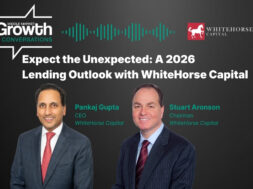HGGC’s Chief Talent Officer Talks Workforce Trends
A Q&A with HGGC chief talent officer Louise Husin

From the start of the COVID-19 pandemic through the economic uncertainty in recent months, various workplace trends have been top of mind for middle-market portfolio companies and their sponsors. Louise Husin, chief talent officer at HGGC, talks to Middle Market Executive about how businesses are approaching hiring and retention, doing more with less, and creating diversity, equity and inclusion initiatives.
Middle Market Executive: Hiring is down this year, and many companies are battening down the hatches and powering through a challenging environment. What are you seeing in terms of supply and demand drivers for talent right now?
LOUISE HUSIN: We back many growth-driven businesses that continue to invest in people, process and technology to help drive growth as part of the value creation plan. Return on investment remains our focus when we’re making any type of investment. Whether it’s talent, process or technology, we need to think about those three things. Doing more with less always helps in that regard, especially in these times.
We’re positive in terms of net head count on a year-over-year comparison. Based on our latest quarterly reporting, the one tactic that we have seen portfolio companies use to manage these tighter hiring plans is to let natural attrition provide relief when appropriate. Some attrition is welcome in an organization and certainly at times like these. It’s also about how you can strategically and opportunistically manage attrition to continue to create value in the portfolio while at the same time staying very focused on key hires.
MME: Which key positions are companies prioritizing?
HUSIN: Hiring definitely continues at the executive level across the portfolio—certainly in talent-related roles and CFO-related roles. Demand is there, and I don’t see that changing. Those are critical key roles on the management team to drive growth in the portfolio.
MME: What are employers looking for in senior executives right now? Are certain qualities necessary to navigate through this challenging market?
HUSIN: Companies continue to focus on finding individuals who have the vision to lead. That is something that can be hard to test for, so you have to stay very focused on that. What I think is really interesting is that the challenges of the past few years—the pandemic, inflation, interest rate movements and the broader macro instability—have really created a perfect storm of conditions that have shined a spotlight on players who have exceeded expectations. There’s been a gift that’s come from that.
If you just step back and think about the skills that leaders have had to demonstrate to navigate turbulent times, it has made those individuals even more marketable than they were before. The types of candidates who you want to find are those who’ve been able to navigate during the pandemic, develop those strengths, and come out on the other side even stronger and more resilient than they were before.
The types of candidates who you want to find are those who’ve been able to navigate during the pandemic, develop those strengths, and come out on the other side even stronger and more resilient than they were before.
MME: Where are we now with some of the pandemic-era trends like the “great resignation” or remote work?
HUSIN: I think of “the future of work” as one large ongoing global experiment. The resignation rate has steadily declined since the spring of 2022 and is getting closer to pre-pandemic levels. The data would suggest that the “great resignation” is in the rearview mirror. With that said, although employees are less likely to leave their jobs now, there is and will continue to be an expectation of flexibility. Things have changed and the work-from-home trends enabled by technology that we saw emerging in the late teens were accelerated by the pandemic. The traditional five-days-a-week-in-office schedule that we all remember seems outrageous now.
Norms changed during the pandemic, and it’s no surprise that hybrid work is growing as a result. Data shows that fully remote work is beginning to decline. Hybrid work is growing because it’s a bit of a meet-in-the-middle strategy that benefits both workers and employers. I think there’ll be more and more hybrid work, and it’ll become very structured in organizations. The focus will be on fine-tuning and optimizing that hybrid work experience to optimize benefits on all sides.
MME: What about retention strategies aside from hybrid work? There might be limited capacity to increase bonuses or compensation structures right now. What else are companies doing to keep employees?
HUSIN: Within HGGC and across the portfolio, we have been leveraging the increased flexibility of the hybrid model to attract and retain top talent. This manifests itself in finding remote hires with specialized talent who were not available in the local hiring market. I think that’s been an interesting opening up of the talent portal.
Related content: From Tactical to Strategic: Human Capital Planning for a Post-Pandemic World
In terms of retaining talent, culture has never been more important. Like they say, “Culture eats strategy for breakfast.” Workers—especially younger workers and early-career professionals—are becoming more and more focused on the culture of the organization. They’re asking questions like: Do I see this as an organization that aligns with my own value system? Is this a place where I believe I can thrive? Am I going to be working with people where I feel supported?
While competitive compensation remains a big part of it, that’s table stakes now. People are looking for those additional aspects of the value proposition like career growth and a culture that resonates. Mentorship is also important: How do I get access to an individual who cares about my career and career growth, and who will give me that advice? Those are some of the strategies that can help retain talent.
There is also diversity, equity and inclusion, which we believe helps drive stronger investment returns. It’s also something that is very important to organizations today and will continue to bring the very best diverse talent to the table. Workers want to be part of an environment where DEI is a priority and where there are clear strategies to achieve that.
MME: How are you advising companies on where to find diverse talent and how to recruit those professionals?
HUSIN: We believe DEI often leads to better investment outcomes, and we are working hard to encourage greater diversity within HGGC and across the portfolio. There are various programs we’ve put in place, such as internship programs where we’re trying to access talent very early
on. There are efforts where we’re working with external organizations to be part of mentorship programs across the industry. We also use community programs. We’ve done a lot of work internally through foundations, and we had our first HGGC Scholars Program this year, which was designed to bring in 15 students from colleges across the California network to spend a day at our firm and learn about careers in private markets.
From entry to board level, we’re trying to build a strong pipeline of talent. A lot of that comes through relationships and playing the long game. I have a view that diversity is never done. There is no destination. It’s about the journey and it’s about constantly staying present, staying focused on goals, and being flexible and willing to consider candi- dates who may not have the traditional background that has been typically prioritized for certain positions. When we can open our minds to think about candidates who have had a different path to success, that opens the talent pool considerably.
Louise Husin is the chief talent officer at HGGC, where she focuses on talent acquisition, management and development at the private equity firm and across portfolio companies. She also oversees HGGC’s diversity, equity and inclusion initiatives.
Middle Market Growth is produced by the Association for Corporate Growth. To learn more about the organization and how to become a member, visit www.acg.org.


